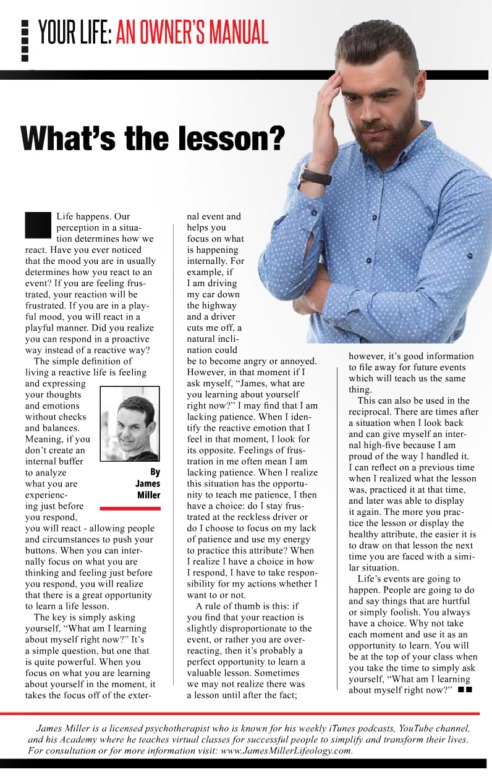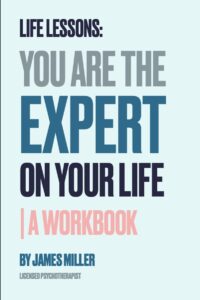Life happens. Our perception in a situation determines how we react. Have you ever noticed that the mood you currently feel usually determines how you respond to an event? If you are feeling frustrated, your reaction will be frustrated. If you are in a playful mood, you will react playfully. Did you realize you can respond in a proactive, healthy way instead of a reactive way?
The simple definition of living a reactive life is feeling and expressing your thoughts and emotions without checks and balances. Meaning, if you don’t create an internal filter to analyze what you are feeling just before you respond, you will overreact. Meaning, you allow people and circumstances to push your buttons. If you internally focus on what you are thinking and feeling just before you react, you will realize there is an opportunity to learn a valuable life lesson.
The key is simply asking yourself, “What am I learning about myself right now?” It’s a simple question, but one that is quite powerful. The goal is to focus on what you are learning about yourself at that moment with your thoughts, feelings, and actions. This then takes the focus off of what’s happening around you. For example, if I am driving my car down the highway, and a driver cuts me off, a natural inclination could be to become angry or annoyed. However, at that moment, if I ask myself, “James, what are you learning about yourself right now?” I may find that I am lacking patience. When I identify the reactive emotion that I feel at that moment, I look for its opposite.
Feelings of frustration in me often mean I am lacking patience. When I realize this situation has the opportunity to teach me patience, I then have a choice. Do I stay frustrated at the reckless driver, or do I choose to focus on my lack of patience and use my energy to practice this attribute? When I realize I have a choice in how I respond, I have to take responsibility for my actions, whether I want to or not.
A rule of thumb is this if you find that your reaction is slightly disproportionate to the event, or rather, you are overreacting. It’s probably an excellent opportunity to learn a valuable lesson. Sometimes, we may not realize there is a lesson to learn until after the fact. However, it’s relevant information to file away for future, similar events that will also teach us the same thing.
This can also be used in the opposite. There are times after a situation when I look back and can give myself an internal high-five because I am proud of the way I handled it. I can reflect on a previous time when I realized what the lesson was, practiced it at that time, and later was able to reenact it again. The more you practice the lesson or display the healthy attribute, the easier it is to draw on that same lesson the next time you are faced with a similar situation.
Life events are going to happen. People are going to do and say things that are hurtful or merely foolish. You always have a choice. Why not take each moment and use it as an opportunity to learn. You will be at the top of your class when you take the time to simply ask yourself, “What am I learning about myself right now?”


 We all get overwhelmed and sometimes don’t know what to do. LIFE LESSONS is your new “go-to” book to help you navigate life.
We all get overwhelmed and sometimes don’t know what to do. LIFE LESSONS is your new “go-to” book to help you navigate life.